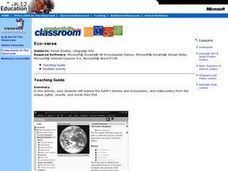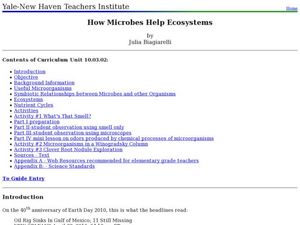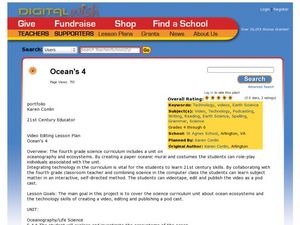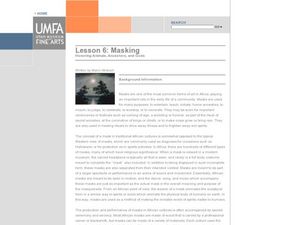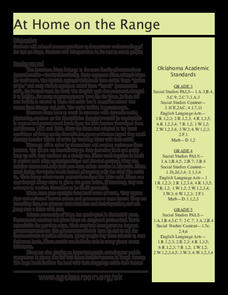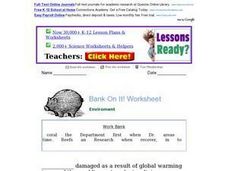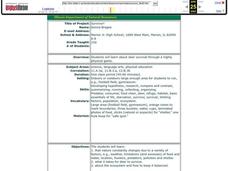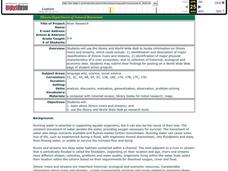Curated OER
The Animals of Julie of the Wolves
Students explore Arctic animal life through use of electronic resources. They discover facts about various animals that share that ecosystem with wolves.
Curated OER
From Lake to Lake
Fourth graders investigate the formation of the Great Salt Lake. They conduct research using a variety of resources. The information is used to construct a timeline of the history. Each phase of history should include facts and...
Curated OER
Putting the Pieces Together
Students, in groups, explore ecosystems, water cycle, rock cycle, and food web. They create a puzzle piece on white butcher paper based on their information.
Curated OER
Vocabulary: Kansas Prairies
Learners explore the ecosystem by reviewing scientific vocabulary terms. In this environmental awareness lesson, students identify the differences between abiotic and biotic factors and their relationship to the Earth. Learners define...
Curated OER
Eco-Poetry
Students explore the Earth's various biomes and ecosystems using Internet research. They create a multimedia poem using the photos, sounds, and vocabulary from their research.
Curated OER
Children's Literature Across the Curriculum Ideas-In The Small Small Pond
Students read In The Small Small Pond by Denise Fleming. They complete a variety of cross-curricular activities surrounding the study of the pond ecosystem. Included are reading, art, math, science, writing, social studies, and library...
Curated OER
Introducing Biodiversity
Students investigate biodiversity by creating reports with their classmates. In this ecosystem lesson plan, students utilize the Internet to research the different types of life in our environment and different locations around the...
Curated OER
How Microbes Help Ecosystems
Sixth graders observe different microorganisms under the microscope. For this biology lesson, 6th graders draw and describe the samples they see. They study the root nodules of plants and explain how the plants benefit from those bacteria.
Curated OER
Ocean's 4
Students create a video about their oceanography unit where they role-play various animals from the ocean. In this oceanography lesson, students create a paper mural and then costumes for the animals. Students role-play the animals and...
Curated OER
Circles Of The Earth Bracelet
Students create a bracelet that has different colored beads to represent different parts of the Earth's environment. The lesson plan has a short summary to be used by the teacher to introduce the concept of Earth Day. The bracelet is...
Curated OER
Ecosystems
Sixth graders perform various labs, create presentations, and do hands on activities to explore the ecosystem.
Curated OER
Masking: Honoring Animals, Ancestors, and Gods
Students analyze the role of masks in African culture. In this African masks lesson, students read about the importance and meaning of imagery of African masks. Students observe animals in local ecosystems and create a mask combining the...
Curated OER
At Home On The Range
Learners explore the history and domestication of the Bovidae family and their importance to our prairie ecosystem. Using a map of the United States, students located the American Great Plains. They complete worksheets and discuss...
Curated OER
Bank On It! Environment
In this science worksheet, learners complete a cloze activity about coral reefs. They select words from a word box to fill in the 15 blanks in the article. This worksheet could also be used for reading comprehension in a language arts...
Curated OER
My Spelling Words: Spelling List #169
For this spelling worksheet, students read and write twelve spelling words. Afterward, they solve a crossword puzzle using the words. All words are related to the ecosystem and endangered animals.
Curated OER
Properties of Water with a Splash of Color
Students explore the properties of water. In this cross curriculum art and physical science lesson, students experiment with a variety of materials to demonstrate the cohesive forces and adhesion of water. Students create a water color...
Curated OER
World of the Pond
Field trip! The class will review what they know about organisms that dwell in freshwater ponds, then trek down to the old water hole to collect specimens for examination. This includes several web links, useful tips, and an excellent...
Curated OER
Bottled Water Ban
Convenience, taste, portability ... what's not to love about bottled water? Apparently, a lot. Scholars analyze the four main arguments supporting and opposing the sale of bottled water. They explore the health, environmental, and...
Massachusetts Institute of Technology
Sentence Structure of Technical Writing
Most teachers and scholars look for a way to simplify information. Informational how-to slides simplify the process of technical writing into a step-by-step process. Learners gather information on what to do, as well as what to avoid....
Curated OER
Wild and Wetlands
Upper graders identify the major characteristics of a wetland. They explore the human factors that change a wetland and write a descriptive paragraph about wetlands. This comprehensive lesson also has an interactive "Watershed Game"...
Curated OER
Survivor!
Students play a game in physical education class to examine how a deer survives. Using nature as a guide, they discover how it is constantly changing due to weather, food, water, pollution and predators. They discuss the characteristics...
Curated OER
River Research
Students use the internet to research the streams and rivers found in Illinois. Using the information, they identify and describe the rivers and streams along with the physical characteristics of a river ecosystem. They share what they...
Curated OER
Animals Antonyms and Synonyms Worksheet
Create a cross-curricular connection for your upper elementary language arts kids. There are 15 vocabulary words listed in the chart, and each has to do with exploring different ecosystems. For each word, the learner must find an antonym...
Curated OER
Links in a Food Chain
Little ones make costumes and act out a rhyme in which there are daisies, bugs, wrens, snakes, and foxes that all interact in a food web. This would be a memorable activity for primary life scientists to participate in as a wrap-up...






